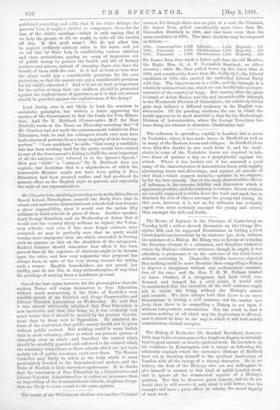The House of Laymen in the Province of Canterbury on
Tuesday held a rather shrewd discussion on the Clergy Dis- cipline Bill, and its supposed Erastia,nism in letting a Civil Court deprive an incumbent by its sentence ipso facto, without the sentence of a Bishop. Mr. Blagg was in favour of reducing the Erastian element to a minimum, and therefore wished to retain the Bishop's ultimate sentence, though he ought, it was admitted, to pronounce it on the sentence of the Civil Court without reviewing it. Chancellor Dibdin, however, objected that nothing could be more Erastian than compelling a Bishop to deprive a clergyman without any ecclesiastical examina- tion of his case ; and the Hon. T. H. W. Pelham wanted to know whether, if a clergyman had been tried, con- demned, and hanged for a civil crime, it would still be maintained that the execution of the civil sentence ought not to vacate the living without the Bishop's assent and consent. We have always held that there is no more Erastianism in letting a civil sentence end the matter ipso, facto, than there is in compelling a Bishop to act upon it without independent examination. But the truth is, that it matters nothing at all which way the deprivation is effected,. and it should be done in the way in which it will best satisfy conscientious clerical scrnples.






































 Previous page
Previous page